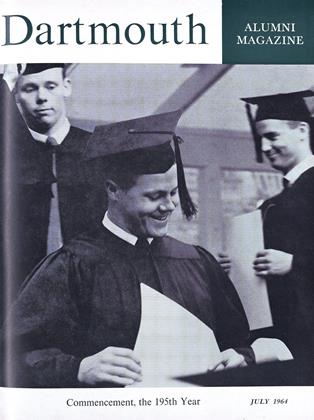THE SECOND AMERICAN REVOLUTION: THE NEAR COLLAPSE OF TRADITIONAL DEMOCRACY.
JULY 1964 KALMAN H. SILVERTTHE SECOND AMERICAN REVOLUTION: THE NEAR COLLAPSE OF TRADITIONAL DEMOCRACY. KALMAN H. SILVERT JULY 1964
By H.Wentworth Eldredge '31. New York: William Morrow and Co., 1964. 403 pp.$6.95.
Professor Eldredge has looked at the American record in recent years and found it unsatisfying. In a thorny, utterly frank, and sometimes disconcerting book, he has once again posed for our time a basic political dilemma: the risks of government by expert as opposed to the risks of government by "feel" and cultural bent. The author, boldly taking for himself the Platonic ideal, argues that the survival and continuance of American society now demands a readjustment of the polity in accordance with the knowledge that modern natural and social science has provided.
The nature of the modern crisis is so profound, he argues, that the United States must meet the challenges to its very existence by providing modern governance, and not a continuance of the archaic. This crisis he sees in four parts: the "dynamic, operationally coordinated Communist ideology," the demand for economic and social progress by the emergent nations, the threat of total annihilation implicit in modern armaments, and the world-wide population explosion.
Professor Eldredge by no means falls into the trap of a simplistic "technocratic" solution. He proposes to make democracy more effective by increasing a certain part of its functionality - in this case opening the society in order to improve the quality (and thus narrow) the polity. Specifically, he proposes that we make our social structure more open to permit much greater mobility, or movement of the individual from one group to another, or from one sector to another. Only in this fashion can government draw on the "aristocracy of talent" required to answer the challenges of the contemporary world. But even should government have the best men, they will be unable to exercise their talents if crippled by our traditional constitutional restraints. They must have a broad range of executive powers if they are to be effective, and supported by a population "educated to its very limits."
Eldredge argues that this elite of talent will be its own guardian, a necessity because "no one else will have ... the skills, time, knowledge, power, or mechanisms to do so." It is clear, however, that he is writing of no nation of clods patiently accepting the dictates of their betters, but rather of a highly open, mobile, and trained population accepting the political decisions of specialized peers as constituting the most efficacious method of government. Control, then, would rest on broad social mechanisms, and not on specifically political ones. In the most profound political sense, Eldredge proposes a revolutionary solution. In the most profound social one, he proposes an enlargement of American idealism.
If the reader approaches this book with a sense of excitement and a willingness to get ruffled, he will not be disappointed.
Professor of Government
 View Full Issue
View Full Issue
More From This Issue
-
 Feature
FeatureA Heritage and An Obligation
July 1964 By SIGURD S. LARMON '14 -
 Feature
FeatureQuebec in the Modern World
July 1964 By THE HON. JEAN LESAGE, LL.D. -
 Feature
FeatureHONORARY DEGREE CITATIONS
July 1964 -
 Feature
FeatureLandauer Heads Alumni Council
July 1964 -
 Feature
FeatureA Look Backward and A Look Ahead
July 1964 By MICHAEL JAY LANDAY '64 -
 Feature
FeatureAnother Record for Reunions
July 1964
KALMAN H. SILVERT
Books
-
 Books
BooksMICROECONOMICS: THEORY AND APPLICATIONS.
NOVEMBER 1970 -
 Books
BooksBig Apple Circus
JUNE 1983 By Frank Small Wood '51 -
 Books
BooksFRANCE ON $50
May 1933 By H. G. R. -
 Books
BooksSTUDIES OF HIGHWAY DEVELOPMENT AND GEOGRAPHIC CHANGE.
February 1960 By H. WENTWORTH ELDREDGE '31 -
 Books
BooksTHE JAPANESE VILLAGE IN TRANSITION
March 1951 By TREVOR LLOYD -
 Books
BooksBlack Pawl
February, 1923 By W. B. P.



